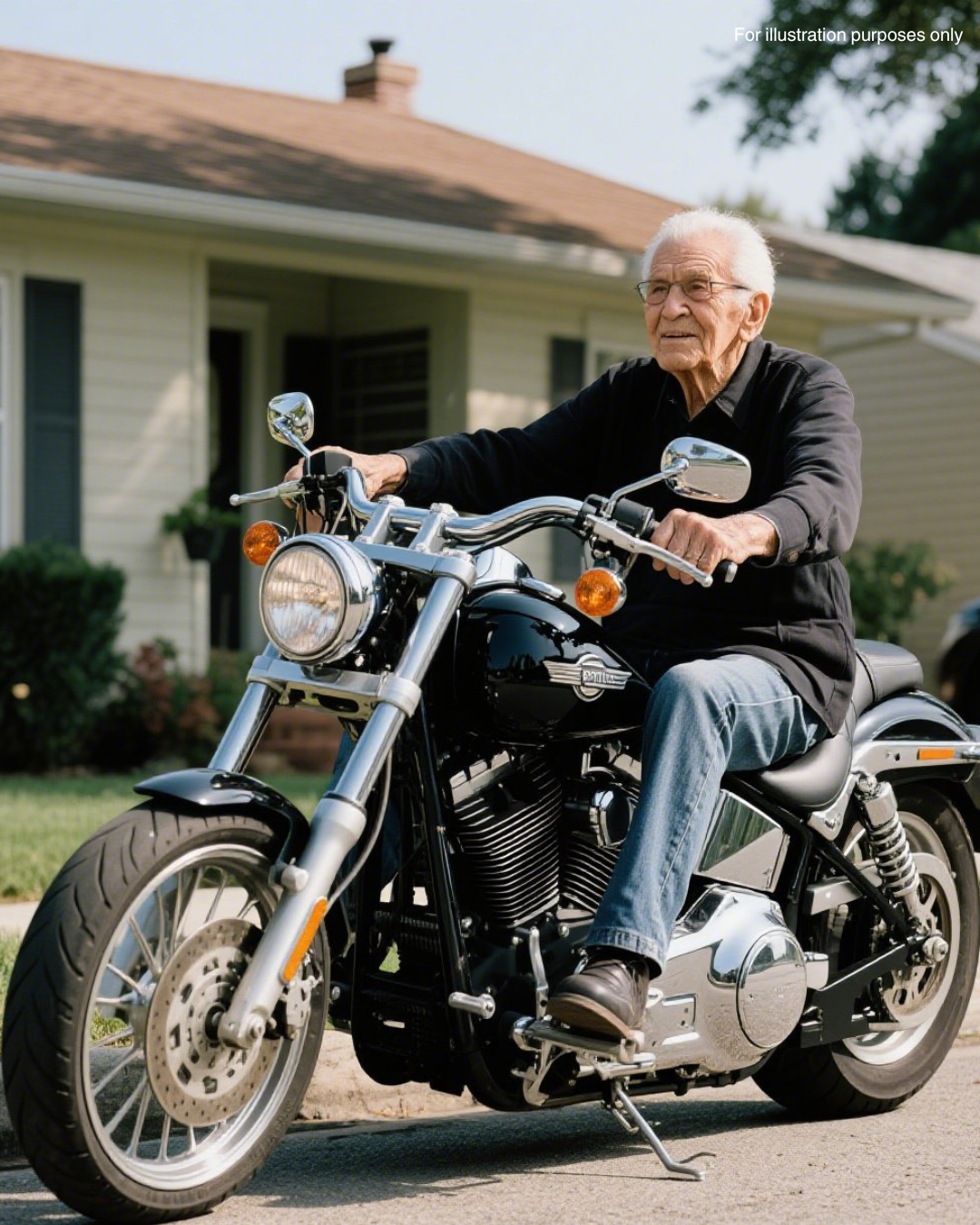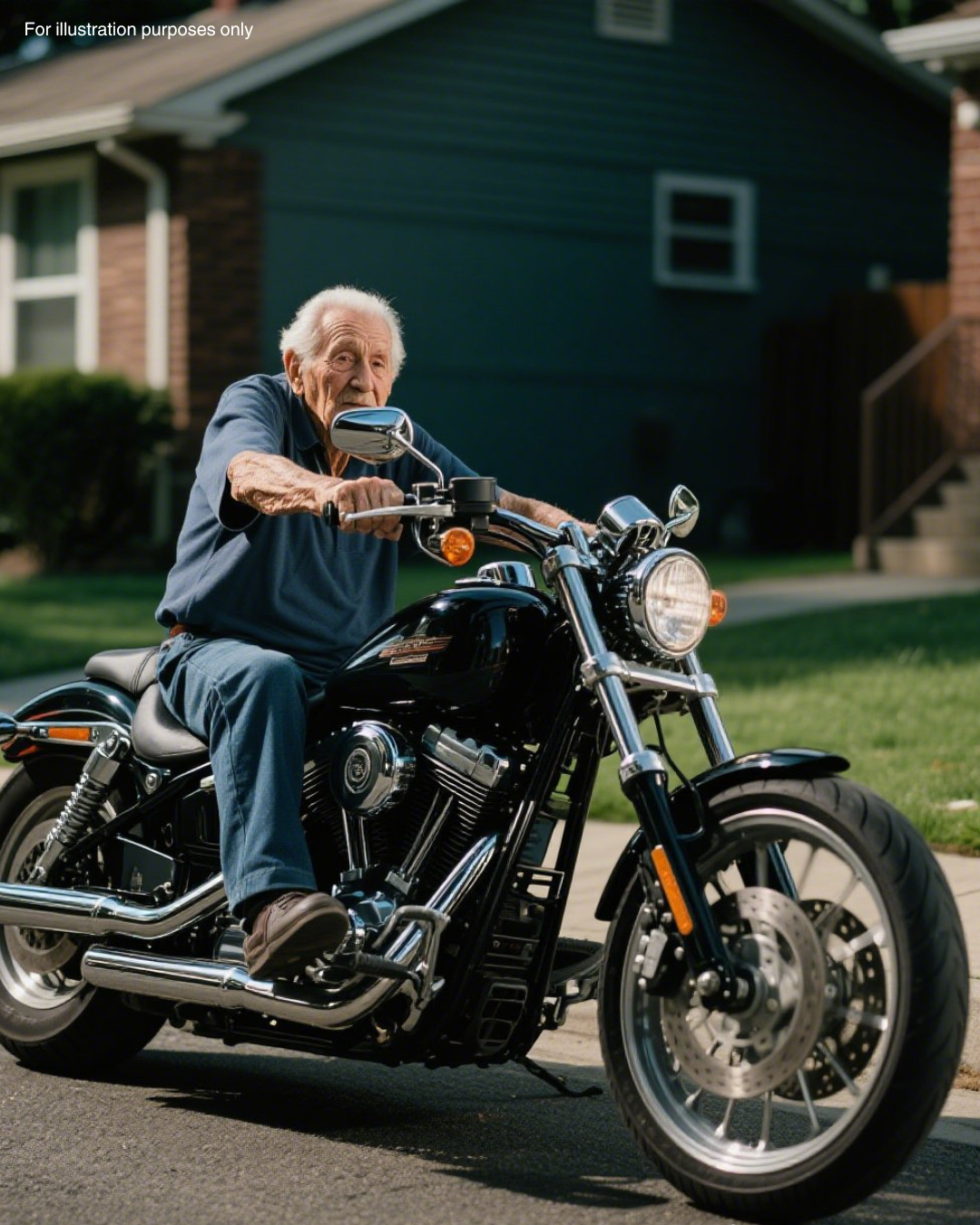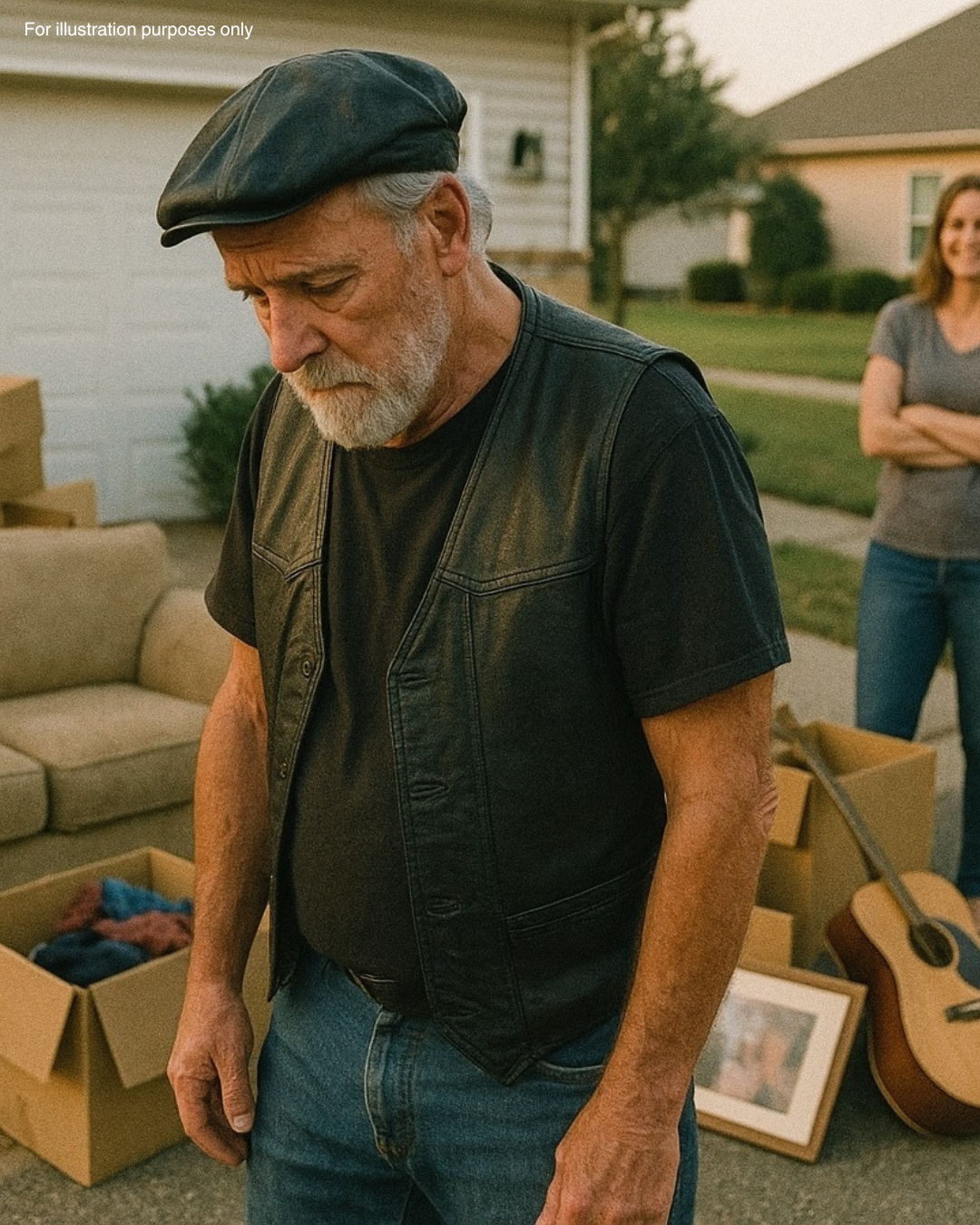I got my 73-year-old neighbor kicked out because his Harley was “too loud” and he looked “too dangerous” for our family neighborhood.
I complained to the HOA board seventeen times. Called the police twice. Even started a petition that got forty-three signatures from other neighbors who were “concerned about property values” and “safety of our children.”
All because Frank Morrison, the leather-wearing, tattoo-covered biker in the house next door, had the audacity to start his motorcycle early every morning.
“It’s inconsiderate,” I told my husband over breakfast that final morning, watching through the kitchen window as Frank wheeled his Harley out of the garage. “What kind of person thinks it’s acceptable to wake an entire neighborhood?”
My husband barely looked up from his phone. “Maybe he works early shifts. You ever think to ask him?”
Ask him? Why would I talk to someone who clearly had no respect for others? The man was at least seventy, probably older, still dressing like he was in some 1960s biker gang. Leather vest, chain wallet, boots that jangled when he walked. In our nice suburban neighborhood where everyone else had the decency to drive quiet SUVs and maintain their lawns to HOA standards.
The breaking point came on a Tuesday when my four-year-old daughter’s nap was interrupted by that thunderous engine. She woke up crying, and I stormed out of the house in my pajamas, not caring who saw me.
“Hey!” I shouted as Frank sat on his idling bike, checking something on his phone. “Do you have any idea what time normal people are trying to sleep?”
He looked up at me through those aviator sunglasses, his graying beard neatly trimmed despite the rough appearance he cultivated. For a moment, he said nothing. Then he simply nodded, put his phone away, and rumbled off down the street.
Not an apology. Not an explanation. Just that dismissive nod, like I was the one being unreasonable.
That afternoon, I sent email number eighteen to the HOA board.
My name is Jennifer Walsh, and I thought I was protecting my family and property values when I launched my campaign against Frank Morrison. I believed every stereotype about aging bikers: that they were dangerous, inconsiderate, probably involved in something shady. The loud pipes, the leather, the visitors who came by on similar bikes – it all added up to someone who didn’t belong in Meadowbrook Estates.
The HOA president, Barbara Chen, was sympathetic to my complaints. “We’ve had concerns about Mr. Morrison before,” she said during an emergency board meeting I’d requested. “He refuses to park his motorcycle in the garage overnight, leaves it in the driveway where everyone can see it. Multiple violations of neighborhood guidelines.”
“What about the noise ordinance?” I pressed. “Surely starting that thing before 6 AM violates something.”
Barbara shuffled through papers. “Technically, the city ordinance begins at 10 PM and ends at 6 AM. But he starts it at 5:47…”

“Every morning,” I interrupted. “I’ve documented it. Every. Single. Morning. Including weekends. It’s harassment.”
The other board members exchanged glances. Mr. Patel, who lived three houses down from Frank, cleared his throat. “Perhaps we should talk to him first? He’s lived here twelve years without any real problems…”
“No problems?” I pulled out my phone, showing them the video I’d taken. “Look at him. Does this look like someone who belongs in a family neighborhood? What happens when our kids see him as some kind of role model? When property values drop because buyers don’t want to live next to a biker?”
It was the property values argument that won them over. It always was in neighborhoods like ours.
The eviction notice was served two days later. Not a true eviction – Frank owned his house outright – but a “strongly worded directive” from the HOA demanding he cease all motorcycle activity or face mounting fines that would eventually force a lien on his property. The message was clear: comply or get out.
I watched from my window as Frank read the notice, saw his shoulders slump slightly. Good, I thought. Maybe now he’d understand that actions have consequences.
The next morning, 5:47 AM, the Harley roared to life as usual.
“He’s calling our bluff,” I told my husband. “He thinks we won’t follow through.”
But I was wrong. The next morning, silence. And the morning after that. By the end of the week, I noticed the garage door stayed closed, the motorcycle nowhere to be seen.
“Finally,” I said to my neighbor Carol during our morning walk. “Peace and quiet. I can’t believe we tolerated it for so long.”
Carol, who’d signed my petition reluctantly, seemed uncomfortable. “Did you ever find out why he did it? The morning rides?”
“Does it matter? The man was selfish, plain and simple.”
Two weeks passed in blessed quiet. My daughter napped peacefully. The neighborhood felt safer, more family-friendly without the daily reminder of Frank’s presence. I’d won.
Then the FOR SALE sign appeared in his yard.
“Good riddance,” I muttered, though something twisted in my stomach. I hadn’t meant for him to leave, just to be more considerate. But if he couldn’t adapt to community standards, maybe it was for the best.
The morning the moving truck arrived, I was washing dishes when the doorbell rang. A young woman stood on my porch, maybe thirty, holding an envelope.
“Are you Jennifer Walsh?” she asked. Her eyes were red-rimmed, like she’d been crying.
“Yes?”

“I’m Lisa Morrison. Frank’s daughter.” She held out the envelope. “He asked me to give this to you.”
“I didn’t know Frank had a daughter,” I said, taking the letter reluctantly.
“He had two,” she said coldly. “And three grandchildren. And a wife who died fourteen months ago. Not that you bothered to learn anything about him before you destroyed his life.”
Before I could respond, she turned and walked back to the moving truck where Frank was directing movers. He didn’t look my way.
I went inside and opened the letter with shaking hands.
Mrs. Walsh,
By the time you read this, I’ll be packing up the house where I lived with my wife Marie for thirty-eight years. You won. The neighborhood will be quieter now. More “family-friendly,” as you put it.
I suppose I owe you an explanation for the morning rides, though you never gave me the chance to offer one.
Every morning at 5:47 AM, I start my Harley and ride to Sunrise Cemetery. It’s a seventeen-minute ride. I arrive just as the gates open at 6:05. I spend thirty minutes at my wife’s grave, telling her about my day, sharing coffee from the thermos she bought me for my 65th birthday. Then I ride home and try to face another day without her.
5:47 AM was when she took her last breath. The hospice nurse said she waited for me to wake up, to hold her hand one more time. Starting my bike at that exact moment, hearing that engine roar to life, reminds me that I’m still alive even when I don’t want to be.
The motorcycle you hate so much? Marie picked it out for my retirement. Said every old soldier deserved to ride into the sunset in style. She loved the sound of it, said it reminded her of freedom and thunder and all the adventures we still had time for. We were planning a cross-country trip when she got sick.
You asked once why I couldn’t be more considerate. Here’s the truth: that morning ride is the only thing that gets me out of bed. It’s my promise to Marie that I’ll keep going, keep living, even though she can’t. Some people have church. I have two wheels and a cemetery road.
The neighbors who signed your petition? Many of them knew about Marie. Mr. Patel used to bring us food when she was going through chemo. Carol walked our dog when I couldn’t leave Marie’s side. They signed because you scared them with talk of property values, not because they minded my bike.
I’m moving to a small apartment near my daughter. No garage, no place for the Harley. I’ll have to sell it. Maybe that’s for the best. Without my morning rides to Marie, I’m not sure what the point of keeping it would be.
I hope you never have to understand why someone would need to hear an engine roar just to remember they’re alive. I hope you never lose someone so completely that a daily ritual is all that stands between you and the emptiness. I hope your life stays so perfectly ordered that you never need grace from your neighbors.
But mostly, I hope you learn to ask “why” before you assume you know someone’s story.
Frank Morrison
U.S. Army, Retired
Husband of Marie Morrison (1951-2023)
Rider of the Last Mile
The letter slipped from my numb fingers. Through the window, I could see Frank carefully loading a framed photograph into his truck. Even from here, I could see it was a wedding photo – a young couple on a motorcycle, her arms wrapped around him, both grinning at the camera.
I ran outside, not caring that I was still in my pajamas, the same ones I’d worn that day I’d yelled at him.
“Frank! Wait!”
He paused but didn’t turn around. His daughter stepped protectively between us.
“Haven’t you done enough?” Lisa asked.
“I didn’t know,” I said, my voice breaking. “I didn’t know about your mother. About why… I’m so sorry.”
Frank finally turned. Without his sunglasses, I could see his eyes clearly for the first time. They were kind eyes, tired eyes, eyes that had seen too much loss.
“No,” he said quietly. “You didn’t know. Because you didn’t ask. You saw an old biker and made up your mind about who I was.”
“Please,” I begged. “Don’t leave. I’ll talk to the HOA, explain everything. Get the fines dropped.”
“It’s too late for that,” he said. “I’ve already accepted an offer on the house. Cash buyer. Closing next week.”
“But your wife… your rides…”
For the first time, his composure cracked slightly. “Sunrise Cemetery is forty minutes from Lisa’s apartment. Too far for a daily ride. I’ll visit when I can.” He turned back to the truck. “Maybe it’s time to let go anyway.”
I stood there crying as the truck pulled away, taking with it a man I’d judged without ever knowing. The neighborhood was quiet now, just like I’d wanted. But the silence felt different – heavy, accusatory, wrong.
That night, I called an emergency meeting with the HOA board and told them everything. The letter was passed around, and even Barbara Chen looked shaken.
“We have to fix this,” I said. “We have to get him back.”
But Mr. Patel shook his head slowly. “The house already has an offer. And even if it didn’t… would you return to a place that made it clear you weren’t wanted?”
The meeting dissolved into arguments and recriminations, but it didn’t matter. The damage was done.
A week later, I drove to Sunrise Cemetery. It took me a while to find Marie Morrison’s grave, but when I did, my breath caught. Fresh flowers lay against the headstone, and a small American flag fluttered in the breeze. The inscription read: “Marie Sullivan Morrison, Beloved Wife, Mother, and Adventure Partner. ‘Ride Free, My Love.’”
Someone had left a folded bandana on the grave – orange and black, Harley-Davidson colors. Pinned to it was a note: “Until we ride again. -F”
I knelt there in the grass and cried – for Marie, for Frank, but mostly for my own small-minded cruelty. I’d stolen a man’s ritual of grief because I couldn’t be bothered to understand it.
When I got home, I found Carol in her front yard. “I should have said something,” she admitted. “When you were circulating that petition. I knew about his wife, but I was too cowardly to speak up.”

“We all were,” I said. “We let fear of being different, of standing out, override basic human decency.”
That evening, I started researching. Found out that Frank Morrison had served two tours in Vietnam. That he’d been married to Marie for 42 years. That he’d worked as a mechanic after the Army, running his own shop until retirement. That he’d raised two daughters who became a nurse and a teacher. That he’d been exactly the kind of neighbor anyone would want, if they’d bothered to look past the leather and stereotype.
The new neighbors moved in three weeks later – a young couple with a Tesla and a designer dog. They loved the quiet neighborhood, the property values, the “family-friendly atmosphere.”
“You’ll love it here,” I heard Barbara Chen telling them. “We maintain very high standards.”
But every morning at 5:47 AM, I wake up to silence and remember what that cost. I think about Frank Morrison, probably lying awake in some small apartment, unable to perform the ritual that connected him to his lost love. I wonder if he still reaches for his keys at that exact moment, muscle memory demanding he keep his promise to Marie.
The Harley is gone, sold to someone who will never know its history. The morning rides to Sunrise Cemetery have ended. The neighborhood got what it wanted – quiet, order, conformity.
But sometimes, in the pre-dawn darkness, I swear I can still hear that engine starting. A ghost of sound that reminds me how I chose property values over humanity, how I silenced a love story because I couldn’t see past my own prejudice.
They say you don’t know what you’ve got until it’s gone. But sometimes, you don’t know what you’ve destroyed until it’s too late to fix it. And sometimes, the price of a quiet neighborhood is the sound of a broken heart, trying to heal in the only way it knew how.
Frank Morrison deserved better than what we gave him. Marie Morrison deserved to have her husband visit her grave every morning at the time she took her last breath. And I deserve to live with the knowledge that I’m the one who took that away.
The neighborhood is quieter now. But I’ve never heard anything louder than the silence I created.
